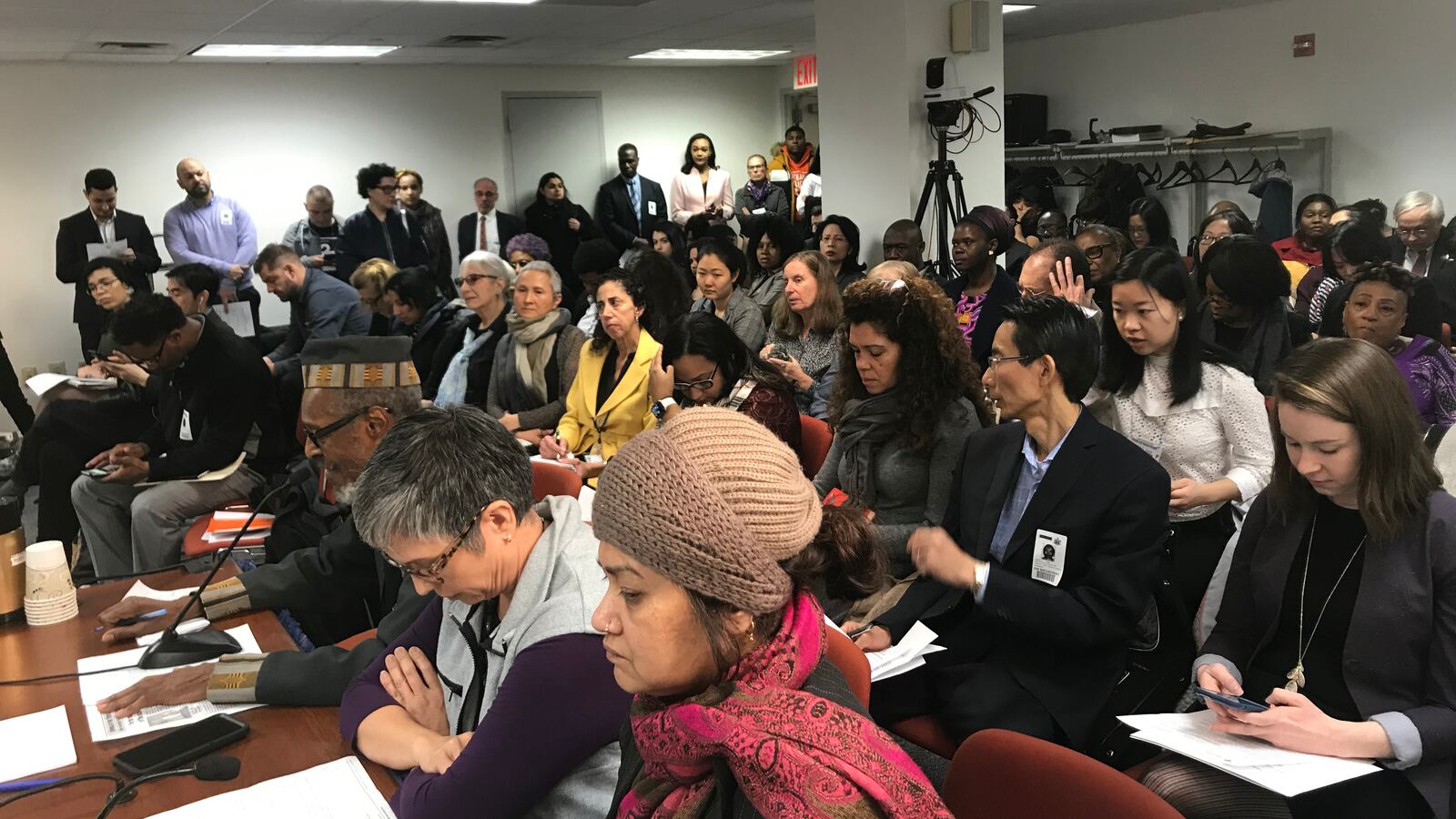Parents and advocates described feeling powerless Friday under Mayor Bill de Blasio’s control of city schools, emboldening some New York City state senators to question how the nation’s largest school system should be overseen.
At a Manhattan meeting of the state Senate’s New York City education committee, senators and the public floated specific changes to how schools are governed, including giving City Council more oversight. Senators on the committee said they’re considering a proposal to extend mayoral control for just one year and creating a commission that would decide how to “improve” school governance thereafter.
But beyond agreeing that parent involvement must increase, de Blasio, who also made an appearance at the gathering, resisted concrete changes to his power over the Panel for Educational Policy, a 13-member group that signs off on major education department decisions like school closures but is largely viewed as providing a rubber stamp.
Many of the parents, education activists, and representatives of community organizations leveled familiar charges against the current governance structure: that the Panel for Educational Policy is subservient to the mayor, who appoints eight of the members — a controlling majority — and that Community Education Councils, or CECs, don’t have substantive power over their schools. For example, some CEC members expressed a desire to have a stronger voice on whether a charter school can share space with a district public school.
Others who spoke criticized specific policy decisions, such as the mayor’s controversial $773 million Renewal school turnaround program and his plan to diversify the specialized high schools, demanding that lawmakers meet with parents, teachers, and students to create a better system.
“Our CECs don’t have enough input or power unless we manage to make enough noise or get the attention of the media,” said Lucas Liu, a member of District 3’s CEC. “We need proper checks and balances.”
The packed, hours-long hearing provided a clearer picture of what has made some state lawmakers leary as they consider extending mayoral control for another three years — a proposal otherwise backed by Gov. Andrew Cuomo and a majority in both houses of the state legislature. The city’s Democratic senators have raised concerns about parental involvement “repeatedly and passionately,” said Sen. Shelley Mayer, chair of the Senate education committee.
The forum also illustrated that the Democratic shift in the state Senate doesn’t mean de Blasio will necessarily have it easy trying to retain control of city schools beyond a single year. In the past, he’s only received extensions of only one or two years, but mostly because Republican senators, who controlled the Senate, often used the matter as a bargaining chip or to punish the mayor for trying to unseat them.
“It’s important that we all know where accountability lies,” Sen. Robert Jackson, who sits on the New York City education committee and represents parts of Manhattan, noted. “I’ve said to you, Mayor de Blasio, before this hearing that mayoral control is a dictatorship.”
Sprinkled among the critics were supporters of the current system. They included former chancellor Dennis Walcott, a member of the Bronx Community Board 10, and members of some community organizations, who spoke in favor of the streamlined process, which allows key policy decisions to come from the top. One young mother earning her master’s degree said that without de Blasio’s signature universal Pre-K program, she would be out thousands of dollars for child care and wouldn’t be able to pursue her studies.
Clergy members, labor leaders, and small and large companies have also signed letters supporting mayoral control.
And despite the criticisms, no one suggested going back to the old way of doing business, which entailed a fractured system of school boards. But several common proposals for curbing the mayor’s power seemed to enjoy support: giving the City Council more oversight of schools; reducing the number of people the mayor can appoint to the Panel for Educational Policy; ensuring fixed terms for Panel members so that they can’t be removed for a specific vote; and providing some means for CECs to help choose school and district leaders.
“Please marry amended mayoral control with a more representative and impactful community voice,” said Kelly Bare, a parent of two children at P.S. 705 in Crown Heights. “Give parents the chance to collectively design a more substantive role in school governance and to report back to you with their recommendations.”
De Blasio and Chancellor Richard Carranza, in their testimony, acknowledged the concerns about parent input and both suggested that parents’ voices had already informed decisions or created actual policies. But Carranza said that the “systemic shifts” in policy he envisions would be tough to realize under any system other than mayoral control.
“We understand also — and I want to be straightforward about this — that in terms of hearing the voice of our parents, we simply have to do better,” de Blasio said, saying he’ll work with lawmakers in the next two weeks to work this into an agreement.
While he offered few specifics, de Blasio said that education department officials must provide faster feedback to CECs and be more responsive to their needs.
But in questions from Jackson and Sen. John Liu, the chair of the New York City education committee, about changing the governance structure, de Blasio said he would not support reducing his appointment power over the PEP or giving members fixed terms because both of those things would undermine the very nature of mayoral control.
De Blasio said he’s never removed a PEP member, and that there have been times where panel members’ concerns about proposals have revised his own thinking. However, a PEP member appointed by de Blasio did resign last year after voting against proposed school closures sought by the mayor.
“You want someone [on the PEP] to reflect the specific philosophy the people voted for,” de Blasio said of his appointees. “I do believe that should be a mayoral right.”
Mayoral control expires on June 30.

